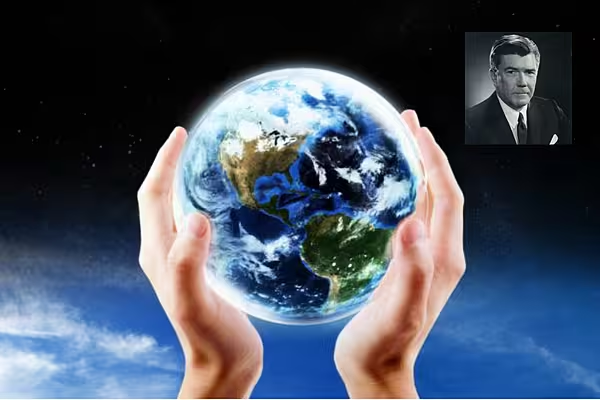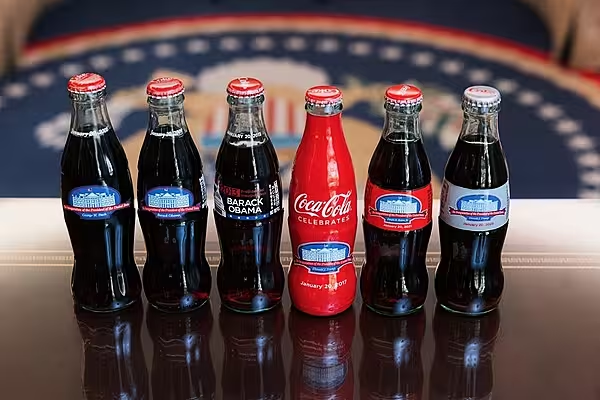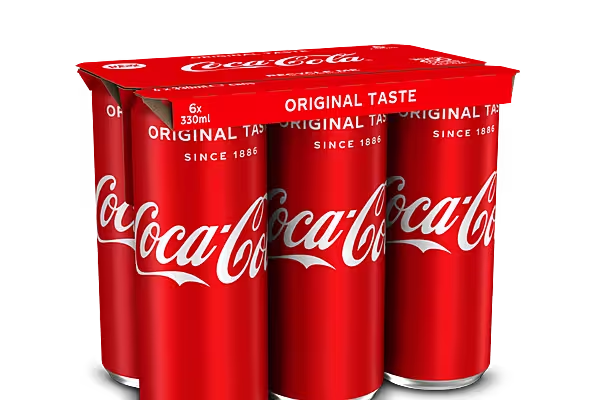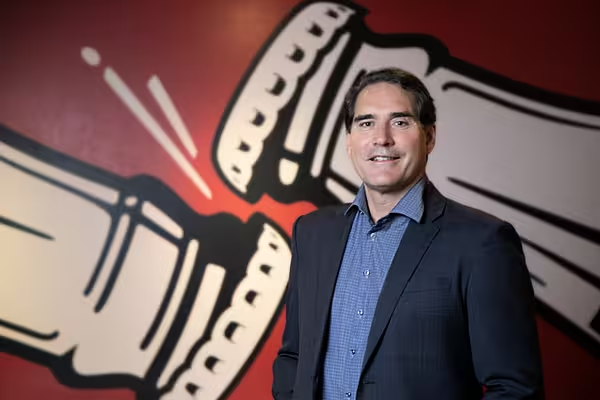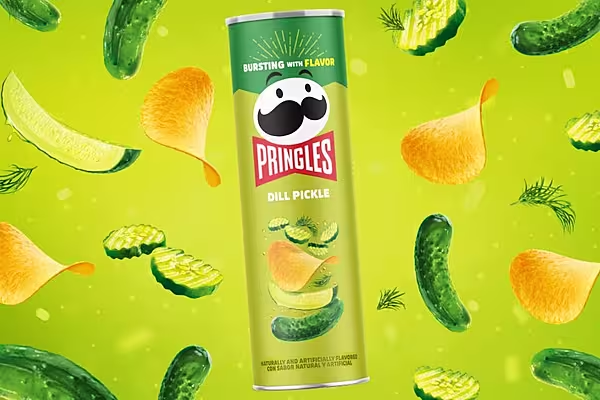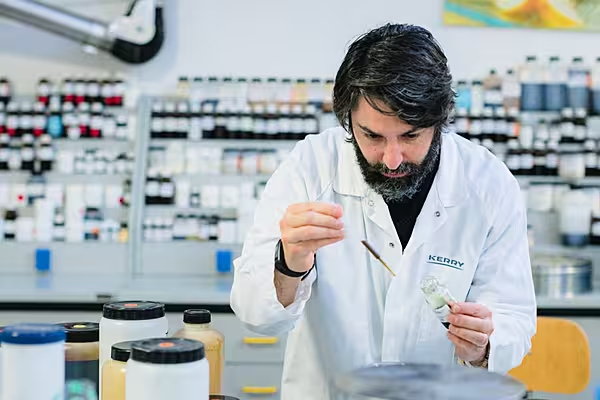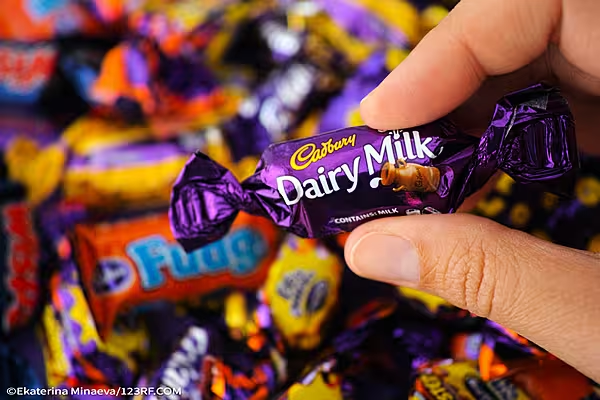As we enter into a new decade, environmental awareness is at the forefront of consumers’ minds, to a greater degree than at any point in human history.
Are we prepared to take the bold steps necessary to keep the planet crucial temperature threshold of 1.5 degrees Celsius above pre-industrial levels?
Or, are we destined to fall short of our aspirations, putting the responsibility on future generations to clean up our mess... if it's not too late, of course?
Some 50 years ago, on 25 April 1970, the then-President of Coca-Cola, John Paul Austin (pictured inset), gave an address to the Georgia Bankers Association which was atypical of a consumer goods leader at the time – advocating the need to embrace environmental sustainability to ensure a clean future for doing generations
It's a speech that is particularly prescient given the current environmental impasse.
Five decades may have passed since these words were spoken, but given the situation we find ourselves in now, we may not have another five decades unless they are heeded.
Here is an abridged version of that speech:
"Rather than invest my time today exploring some of the financial and economic pressures that face both of us – as bankers and businessmen – I would like, instead, to talk with you quite seriously about an even more pressing matter. This is one that involves us even more directly and far more personally, than matters of finance.
"I'm talking about our environment. This is the most urgent problem any of us has right now ... not just as businessmen, but as human beings, as Americans who honestly care for this land of ours.
"Most of us in this room have children. But, have we paused recently to reflect on the legacy we're creating for their generation? Have we thought much about the quality of the life they will enjoy – or be forced to endure – largely because of the decisions and acts you and I undertake ... or worse, fail to attempt, during this decade of the 70s?
"Not long ago I realised that my sons will reach my age sometime late in the first decade of the twenty-first century. A realisation like this can bring a man up short. If you share my concern for the happiness, the hope and well-being that all today's children will find in their world of tomorrow, I know you'll agree that it's about time we began doing more than merely hoping that the world we leave them will still be hospitable to man. The hard facts, the stark evidence of environmental homicide that's emerging today indicates with painful reality that my sons may not find this a hospitable home at all.
"By the time they're my age – when they should be enjoying real fulfilment and meaningful satisfaction in life – there may be little left on this world to be satisfied with.
"Last year when this country put two men on the moon, I found myself transfixed by the televised pictures of that incredibly barren lunar landscape. How cold and utterly dead it seemed. And then I wondered, could that bleak terrain, with no natural life stirring anywhere between the eye of the camera and a distant, pock-marked horizon – could that same desolation someday be the look of this world? Someday – no matter how far in the future – might we look like that to a pair of alien explorers from another star system?
"And what if that were the grim prospect for the future of earth? Wouldn't at least some of our children – or, maybe, their children – look to the stars as the only alternative to death on a dying planet?
"While we don't now see interplanetary migration as a serious possibility for future generations. I can't help wondering if migration might someday become the only acceptable alternative. No matter for how few, some may well prefer the uncertainties of space to the predictable death right here.
"Is this an overstatement of the imperatives for cleaning up our world? I don't think so. After all, what has man always done after he leached the land and so thoroughly fouled his water that it was no longer tolerable? He picked up and moved. He has always been able to find another, more hospitable home on land that would grow lush crops – in a place where the streams hadn't yet been spoiled.
"But man can move no more. Not on this world, anyway. Sure – there are the vast savannahs of the African wastes. And the perma-frost of barren Arctic reaches. There's still plenty of raw real estate around. But, until now, at least, man hasn't solved the problems of living on lands like these.
"That's why he's packed himself – and almost four billion like him – into only a fraction of Earth's total landmass. Perhaps that's also why he's submitted to the increasingly popular urge to rush, lemming-like, into the cities of his world. Already, we're told, over a fifth of the planet's entire population lives in cities of a hundred thousand or more.
"So to add to the manifold problems of land waste, the prodigal depletion of both land and water, and the all-too-visible carbonisation of our air, we must also add geometric multiples of human beings. Vast hordes of humanity which must somehow be fed, housed, employed and coped with by each other.
"So, twenty-first century man may find himself faced with the necessity to colonise other planets if only because he's run out of room on this one. But, sadly, a glut of humanity is likely to be the least among his motivations to move.
"Why? Simply because some of today's most eminent scientists are saying that the relatively few people on Earth right now are doing more than an adequate job of totally destroying their environment.
"Even without another ten or twelve billion people, we're told we haven't much of a chance to survive, unless we make some dramatic commitments right now.
"Who are these scientists? Who is behind all the environmental doomsday talk we're hearing today? And why are they seemingly going out of their way to get everybody all upset about the mess we're making of our environment?
"There are two answers here. The scientists are ecologists. And they're shouting warnings at us because we're wasting our natural wealth, because, they tell us, we have no inkling of the enormity of the problem we've created – or, perhaps even more importantly – the terrifying and unacceptable consequences of our ecological ignorance and irresponsibility.
"Everything around us is tied together in a closed system of interdependence. It's called an 'ecosystem' – the sum total of all the living and nonliving parts that support a chain of life within a selected area.
"Now, remember, undisturbed an ecosystem will continue to operate indefinitely. And there's the problem. Man hasn't – perhaps he can't – leave the system undisturbed.
"The rewards of man's own system don't seem to allow a peaceful co-existence with nature. Or at least, man's attitudes and values he demonstrates everyday in seeking his rewards haven't operated in the best interests of his ecosystem.
"Man is a doer. He's a road-builder, a housebuilder, a tree-cutter; an industrious, hardworking chap whose very industry determines the size of his rewards. And, being rather selfish – or, shall I say, operating in his own self-interest, anyway – this doer, this creature with the big brain has chopped and hacked and paved and built... and polluted his way from one end of this once virgin land of ours to the other.
"Hard driving free enterprise is a fine old tradition in this country. It's what's made this country what it is. So what is wrong with free-wheeling progress?
"Maybe nothing is wrong with it but on the other hand, maybe the ecologists are trying to tell us something. They're telling us – in quiet, clear tones – that if we keep all this up, we're going to 'advance' ourselves into oblivion. An oblivion comprised of undrinkable water and air that can't be breathed.
"Listen to what they're saying. Think about some of the mid-twentieth century realities they're pointing out to us as we plunge headlong in pursuit of 'progress'.
"They're telling us that, as a people, we're firing rockets at the moon – while standing knee deep in our own garbage. They say man is the only creature in nature who, apparently with great foresight and planning, dumps that same garbage into his drinking water.
"Researchers point out that right now – in the breasts of this country's young mothers – there is human milk containing from three to ten times more pesticide residues than the government will allow in cow's milk meant for human consumption.
"Ecologists are disturbed over the decline and disappearance of whole species. Fish, fowl and other types of wildlife are finding it increasingly more difficult to adapt to an unnatural environment which rots fins and gills – an environment where unprecedented concentrations of death-dealing chemicals mutate the young.
"And, recalling that first law of ecology – that everything is connected with everything else in nature – we're beginning to understand that there is no such thing as an isolated act."
"Large amounts of pesticides – not merely traces – are found today in the freezing waters of Antarctica where none has ever been used before.
"It is said that this country alone is clearing, paving and – if you still buy the term 'improving' – some three thousand acres a day. Plants and trees on these once-lush tracts are lost forever. They're oxygen producers, remember. And some very responsible scientists are expressing real fear that, if this wholesale land improvement continues at our present rate for a few more years, there won't be enough oxygen in either the air or the sea to sustain life.
"Now, you know why I am so upset about environmental pollution. However, let me be even more specific.
"I'm concerned, because you and I are killing each other, and I'm deadly serious when I say that. Unless you and I and every other responsible American – especially those who guide the policies of our major corporations and those who sit in the halls of our councils, legislatures and the Congress – unless all of us begin immediately to reverse the processes of impending self-destruction which we have set in motion – this green land of ours will become a graveyard.
"The youth of this country know what the stakes are. They're upset. And they're indignant over our apparent unconcern. Whole student populations are engaging in protests and demonstrations against those who compound their transgressions of pollution with an abysmal ignorance of man's responsibility to his environment.
"Why? Because it's their world we're wasting. And, to put it mildly, they don't like it a bit.
"And I commend our young people for their awareness and perspicacity. They have done all of us a service by pushing the panic button.
"The government can't solve our problem. The government has been trying to do something about pollution and environmental decay since the first administration of Teddy Roosevelt. The people, though, can do something. And it will take the best effort of every individual and corporate citizen to do what must be done.
"Of course, there are the 'doomsdayers' who say nothing will prevent 'ecocide', the death of the environment. Others claim that, since ecological destruction is so intimately linked with over-population and over-production, the only answer is a zero population increase and a stable Gross National Product. And it may be that they're right.
But, before ultimate measures such as these are imposed on us, shouldn't we at least attempt some determined solutions of our own?
"In setting our policy and stating our commitment, The Coca-Cola Company accepts a dual responsibility. We acknowledge and accept the responsibility for having been a limited contributor to the problems in the past. But, at the same time, the company accepts the responsibility to set its own house in order.
"Those aren't mere high-sounding pleasantries to be forgotten or ignored by this time tomorrow. Those are commitments. Commitments to be met while discharging our responsibility to our stockholders to operate our business at a reasonable profit level.
"Trying to find new ways for this company to serve the best interests of our environment, new ways to prevent our contributing any further to the problems of pollution, new ways to more responsibly share in the task of environmental renewal that's ahead.
"But no company-no matter how large or influential – can do more than share in this task. I believe this company is doing its share in attacking the problems of our environment. And we're glad to see other responsible companies joining us in this effort.
"But, more than just the corporations of this country, each of us, as individuals must commit himself and actively get involved in the massive job that's ahead.
"We can no longer accommodate the selfish acts and unthinking environmental waste of which each of us is guilty. We have to change! And this may well require – even demand – some basic revisions in our traditional attitudes. But, whatever it takes, we must require it of ourselves, and, if necessary enforce it with others.
"For the only alternative to commitment and intelligent action now may be the possibility of extinguishing ourselves through ignorance and indifference.
"There is no political spectrum here, no colour line, no generation gap, no public-private sector conflict, no urban-rural clash, no "haves" and "have nots", no doves and hawks in this issue. We share this fragile issue braided together. Thus saving our environment can give us a national purpose. It is the one crisis, the unique challenge, that can knit this nation together again. It can give us a vital national goal, give us all a new sense of purpose, of sharing and of accomplishment.
"We must begin now. We must begin together. There is no place to hide."
Taken from a speech John Paul Austin, president of Coca-Cola, gave to the Georgia Bankers Association on 25 April 1970.
© 2020 European Supermarket Magazine – your source for the latest retail news. Article by Stephen Wynne-Jones. Click subscribe to sign up to ESM: The European Supermarket Magazine
